Presidential election in Cyprus, 5 and 12 February 2023

Yiannos Katsourides
Associate professor at the University of NicosiaIssue
Issue #4Auteurs
Yiannos Katsourides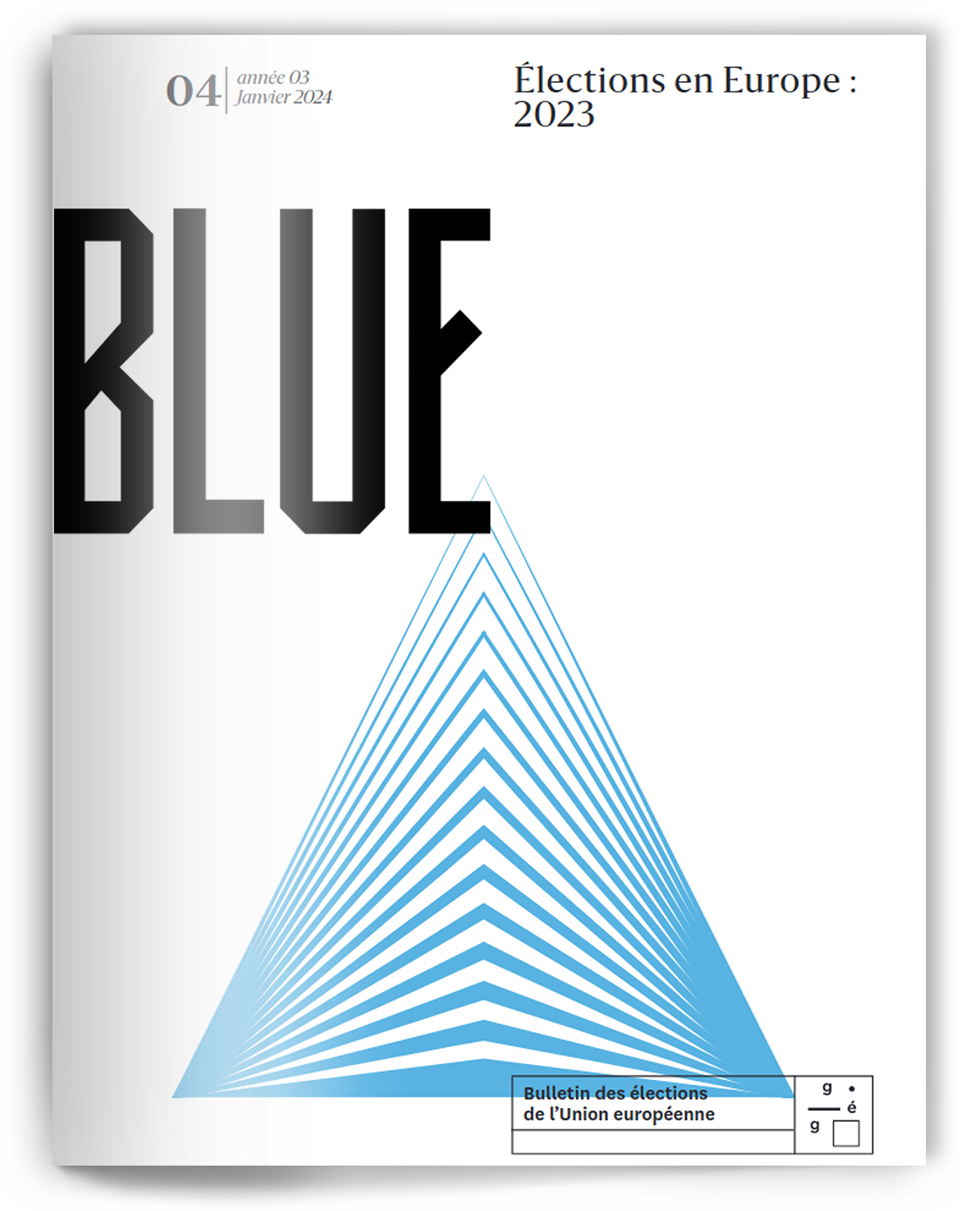
Issue 4, January 2024
Elections in Europe: 2023
On 5 and 12 February 2023, Cypriot voters went to the polls to elect the eighth president in the history of the Republic of Cyprus. The Constitution of the Republic provides for a clear separation of powers. The executive power is exercised by the president, who appoints the cabinet and is not accountable to parliament. The latter plays a secondary role in the political system. The power vested in the president’s office places the elected president, who is both head of state and head of government, at the heart of the political system. As Cyprus has the most powerful presidential system in the EU, it is crucial for all political actors to have access to the executive, and hence the presidential election is the most important election taking place in the country. The constitution provides for a two-round system of elections if none of the candidates surpasses the threshold of 50% plus one vote in the first round, thus requiring all political parties to seek alliances.
Background
All the findings and indications from this particular campaign seem to be consistent with social and electoral trends already present in the electorate, as well as with the overall dynamics of the party system. Current trends include the overall discrediting of political institutions, especially political parties, and the very low levels of trust they enjoy; the ever-increasing autonomy of the voters from political parties and the individualization of their political behaviour; and the further weakening of the once powerful party mechanisms. Thus, while ‘party machines’ still play an important role in political campaigns, this role no longer appears as decisive as it used to.
At the same time, one observes a hidden, and often overt, anti-systemicism, which is better understood as a form of opposition to the practices of traditional parties (e.g., clientelism, corruption, scandals, etc.), leading to increased protest voting. This anti-partyism is mostly directed against the four older parties of the island: the right-wing Democratic Rally (DISY), the renewed communist party AKEL, the centre-right Democratic Party (DIKO) and the socialist EDEK. Anti-systemicism is an expression of distrust in what citizens perceive as the political establishment, of which the four main parties are considered part and parcel.
It is in this context that traditional parties have lost a significant electoral share since the turn of the new millennium. Indicatively, the four main parties commanded 93.14% in the 2001 parliamentary elections compared to 68.12% in 2021, thus creating gaps in political representation but also conditions of fluidity and unpredictability in the party system.
The outgoing government headed by N. Anastasiades, a former DISY leader, ruled the country for the last 10 years. He was first elected in 2013 amidst the economic crisis, and his reelection in 2018 was based on a combination of two factors: (a) an acknowledgment that his economic policies had led to the stabilization of the economy; and (b) the discredit of the opposition, particularly AKEL, and its inability to present a coherent, viable and trustworthy alternative. His second term was spoiled by corruption accusations and scandals, a period in which he lost all allies and governed by relying only on the support of his own party, DISY.
The campaign, the parties and the candidates
The 2023 campaign was the longest ever in presidential elections; a campaign that officially kicked off on December 2021, fourteen months before the election day, when the president of the ruling right-wing DISY, A. Neophytou, publicized his candidacy. His eagerness to announce his intentions was as a means to fence off competition from N. Christodoulides, the very popular foreign minister of the outgoing government, a party colleague and close associate of the departing president, N. Anastasiades; however, this strategy was not successful. Christodoulides cleverly avoided entering the intra-party procedure for candidate selection, knowing that he was in a disadvantageous position compared to the party president, who controlled the party’s electorate. He also resigned from his position in the ministry to focus on his electoral campaign. As a result, the party spent the entire campaign under conditions of division and internal rivalry that were reflected in the polls, with approximately 40% of DISY voters indicating a preference for Christodoulides. Moreover, DISY was politically isolated from all other political parties.
The opposition also failed to reach an agreement on both the candidate and the ‘manifesto for change.’ Their differing approaches and wants turned out to be much more powerful than their desire for cooperation and change in government. Their paths drew apart, with most of the opposition parties (DIKO, EDEK, the centre-right DIPA [a split from DIKO] and other smaller parties) eventually, and somewhat awkwardly, endorsing Christodoulides’ candidacy, largely because of his established popularity. After failing to reach an agreement with other opposition parties, AKEL oscillated between the centre-right candidate A. Mavroyiannis, a public servant in the ministry of foreign affairs and former negotiator for the Cyprus problem – whom they eventually endorsed – and the lawyer A. Demetriades, an activist in the Cypriot reunification movement.
The far-right National Popular Front (ELAM) remained consistent with their practice of presenting their own candidate: the party’s president, C. Christou. This strategy contributed to solidifying their audience and electoral presence. The Greens were unable to (officially) support any candidate because their statute provides for a 60% majority in favour of a candidate for her/him to be endorsed, a barrier the party’s electoral assembly proved unable to overcome since opinions varied.
Overall, 14 candidates of different ideological orientations contested the election. However, almost all candidates came from the centre-right and right of the political spectrum. The candidates can be grouped into three broad categories: the three main candidates supported by major parties (Neophytou, Christodoulides and Mavroyiannis); the four ‘minor’ candidates, i.e., the leader of the far-right ELAM and another three without any support from a political party but with decent public support in the polls (Demetriades, Kolokasides and Christophides); and the remaining seven, more marginal candidates.
| Candidate | Party(ies) in support |
| Averof Neophytou | DISY |
| Andreas Mavroyiannis | AKEL |
| Nicos Christodoulides | DIKO, DIPA, EDEK (also supported by the Solidarity Movement and the Hunters Movement) |
| Christos Christou | ELAM |
The electoral trends regarding the main candidates, as reflected in the nearly 50 opinion polls, remained fairly stable throughout the campaign. N. Christodoulides headed the race from the beginning until the end, whereas the other two main candidates – A. Mavroyiannis and A. Neophytou – fought head-to-head between them for second place, with Mavroyiannis gaining momentum in the last months of the campaign. Both DISY and AKEL charted a ‘rally-around-the-flag campaign’, realizing that they were fighting for survival; it was the first time that both big parties faced the imminent danger of being eliminated before the second round. However, this strategy also prevented them from appealing to voters beyond their traditional party audiences, particularly DISY. Christodoulides positioned himself as a candidate capable of uniting Cypriots beyond party affiliations and bringing together all citizens beyond ideological divides, capitalizing on his wide acceptance by voters from the entire party spectrum. The so-called ‘minor and marginal candidates’, pledged for an anti-systemic vote and held a significant share in the polls throughout the campaign (above 15%).
The campaign, although toxic in some respects, was overall less polarized and heated than previous pre-election periods. This was mostly the result of the rather small differences in the three main candidates’ manifestos on ‘big issues’. All three candidates agreed that for the Cyprus problem, the intended goal of an agreement must be sought in the context of a bicommunal, bizonal federation (BBF); on economic issues, they all favoured a mixed system emphasizing entrepreneurship; and finally, all parties agreed that Cyprus’s position within the EU and the West should be preserved.
The most salient campaign issues were not too different from those of past elections. What differed was their hierarchy. The once dominant Cyprus problem took second place, except in some short periods of the campaign when the inability of the outgoing government to reach an agreement in the last round of negotiations was brought to the fore. The economy in its various dimensions (welfare state, labour relations, inflation, cost of living, housing, poverty, unemployment, etc.) took precedence, along with corruption and immigration issues. Issues of corruption were a key aspect of the opposition’s campaign, which stressed the government’s failures in the so-called ‘Golden Passports’ investment scheme that provided for wealthy individuals to obtain Cypriot citizenship in exchange for significant financial investment in the country. The programme was criticized for the lack of adequate due diligence measures that allowed individuals with controversial backgrounds, including those facing criminal investigations and sanctions, to acquire Cypriot and, by extension, EU passports. The main criticism, however, was directed against the president himself and some of his ministers, who were accused of having personally benefited from the scheme.
The results
The total number of Cypriot citizens over 18 years old,and therefore eligible to vote amounted to 724,619. However, only 561,273 of them registered. This means that approximately 164,000 Cypriot citizens chose not to appear on the electoral rolls (about 23%). Among these 164,000, nearly 72,000 are in the 18-25 age cohort.
The first round (5 February 2023)
In the first round, N. Christodoulides, as expected, came out first with 32.04%, obtaining support from approximately one third of DISY supporters. The latter was crucial, as it was the decisive factor that allowed him to progress to the second round. Christodoulides had chosen not to distance himself from his party and the government he served for nine years, a strategy that paid dividends. Mavroyiannis scored 29.59% and ranked second, a rather surprising result and above all expectations. A. Neophytou ranked third with 26.11%. This left DISY in a very frustrating position, as it was the first time that the party’s candidate did not make it to the second round of a presidential election.
Apart from the ELAM leader, the so-called ‘minor’ candidates did not fare as well as expected, obtaining a mere 6.21% in total. Going into the final days of the campaign, they suffered from the pressure of the AKEL and DISY campaigners fighting for a ticket to the second round, who successfully used the ‘lost vote’ argument. The far-right candidate, C. Christou, leader of ELAM, polled 6.04%, confirming that the Greek-Cypriot far right was there to stay.
| Candidate | % |
| Nicos Christodoulides | 32,04 |
| Andreas Mavroyiannis | 29,60 |
| Averof Neophytou | 26,11 |
| Christos Christou | 6,04 |
| Achilleas Demetriades | 2,04 |
| Constantinos Christophides | 1,59 |
| Giorgos Kolokasides | 1,33 |
| Others | 1,25 |
Abstention reached 27.95% (156,952 voters). Adding this figure to the number of those who did not register reveals that approximately half of the population eligible to vote did not exercise their right, thus putting the legitimacy of the result into question.
The results testify yet again to the strong right-wing leanings of the Cypriot electorate. The only purely leftist candidate achieved only 0.22% (867 votes), while the candidate supported by the mainstream left, Mavroyiannis, scored only 29.6%. The (centre-)right is electorally dominant and politically hegemonic in Cyprus.
The exit polls also revealed that a significant number of voters only made their decision in the last few days, or even on election day, with the majority of them choosing Mavroyiannis. This largely explains the very good results of Mavroyiannis and the closing of the gap with Christodoulides.
In the aftermath of its defeat, DISY was forced into a very tense introspection process. A heated Political Bureau taking place on the day following the first round exposed the party’s internal divisions: while the outgoing President of the Republic, N. Anastasiades, wanted DISY to support Christodoulides, A. Neophytou and his intra-party supporters favoured Mavroyiannis. Both groups eventually decided to recommend a ‘vote of conscience’. However, the scars were deep, and the party announced an electoral conference in two parts: in March 2023, the election for party president would take place, while the rest of the party leadership would be renewed in May 2023.
The second round (12 February 2023)
Nikos Christodoulides won the run-off with a much smaller margin than anticipated: 51.97% against 48.03% for A. Mavroyiannis. The turnout was 72.45%, -0.40 points compared to the first round and -1.52 points compared to the second round of the presidential election in 2018.
It was the first time in Cypriot electoral history that the elected president was not supported by any of the two major parties. This development acquires special importance in view of the consequences of the presidential election on the balance of power within the party system and within parliament in particular. The president does not enjoy a majority in parliament. While this is nothing new in the parliamentary history of Cyprus, it is the first time that both big parties are in opposition. This state of affairs means that seeking alliances and compromises for passing legislation will be a constant struggle and that these alliances may be short-lived unless one of the two big parties (this is only applicable to DISY) decides to join the government coalition in the near future.
ELAM voters were expected to vote for Christodoulides not only because the party’s decision indirectly pointed to Christodoulides but also because they would never side with any candidate supported by the left-wing AKEL. DISY voters, on the other hand, were the focus of attention since their vote would determine, to a large extent, the new president. A. Neophytou and those in DISY who wanted to punish Christodoulides because of his ‘defection’ from party decisions were left exposed by the vast majority of the party voters. Exit polls clearly showed that approximately 75% of DISY voters who went to the polls voted for Christodoulides, showcasing that the left-right division still permeates a large part of DISY’s social base.
The conclusion of the elections brought a gloomy day for DISY and its president, who was forced to resign although he had previously declared that he would stand in the intra-party election for party leader.
The day after
The final results are not so clear as to whether Cypriots actually voted for change or continuity. On the one hand, the majority seems to have chosen continuity, as Christodoulides was presented as the candidate closest to the outgoing president and government. On the other hand, the very fact of his election points to a discontinuity with the past; Christodoulides ran as an independent candidate and against his party’s will, but eventually won the election.
The new president created big expectations, which were immediately watered down by his first political act: the appointment of the Cabinet, which did not meet most of his pre-election promises and criteria (e.g., gender quotas, no previous service in respective positions, etc.). The interest now lies more with his policies regarding immigration, corruption, the relationship with the Church and the Cyprus problem and less on the economy, a policy field in which he is expected to continue the economic policy of the previous government. Christodoulides is definitely on a difficult mission since his decisions might jeopardize the minority support he enjoys in parliament. Much will depend on DISY’s decisions and behaviour towards his government. The tensions are now eased and many DISY cadres have argued that they must find ways to reconnect with the elected president. To this end, Christodoulides, in agreement with DISY, decided to sit with the leaders of the European People’s Party (EPP) in the European Council.
The outcome of the election is not suggestive of a dramatic transformation in the Cypriot party system. Traditional parties seem to endure despite the problems they once again encountered, and the ‘minor’ candidates did not achieve the results that would easily allow them to proceed and form new party platforms as some of them had announced before the elections. The centrist parties that supported the elected president – DIKO, DIPA and EDEK – have obtained additional time to resolve their internal difficulties. Moreover, they have access to the government and all the benefits that this might imply for their constituencies.
The far-right ELAM has further consolidated its presence and normalized its positions and rhetoric among the electorate. The Greens, although in opposition, need to redefine their role, as they were practically unable to affect the process due to their internal regulations.
AKEL is in a much more relaxed position after Mavroyiannis’ good result, but turmoil could lie ahead. After all, 2023 saw AKEL’s third consecutive defeat in a presidential election. The party is also having an important statutory conference in September 2023, at which changes in their organizational modus operandi are expected. Some party members and collaborators demand an opening towards the centre-left which could trigger wider discussions regarding the party’s identity. Moreover, there are signs of change on the left and centre-left of the ideological spectrum: DIEM25’s Cyprus branch has announced its operation and intends to contest the 2024 European election. D. Papadakis, a European MP elected with EDEK who is now expelled from the party, has also announced his intention to form a new centre-left party along the lines of European social democracy.
DISY was the party with the most serious problems at the conclusion of the elections. However, the turmoil seems to have died down, with all party officials now emphasizing the need for unity. The resignation of A. Neophytou opened the way for the party’s new generation. Two young cadres contested the elections for the presidency, with the current president of the parliament, A. Demetriou, aged 38, winning the contest and becoming the first female president of DISY. Subsequently, all other candidacies for the remaining high-ranking positions were submitted by people who had never served in these positions before, leading to the complete renewal of the party’s leadership. Whether the party will gradually move closer to the government or remain in opposition, as their current decision provides, will have a significant impact on the political system. What is already obvious, however, is that DISY is struggling with an identity crisis that touches upon many domains, including its ideology, alliances, and relations with the government.
The Data
First round
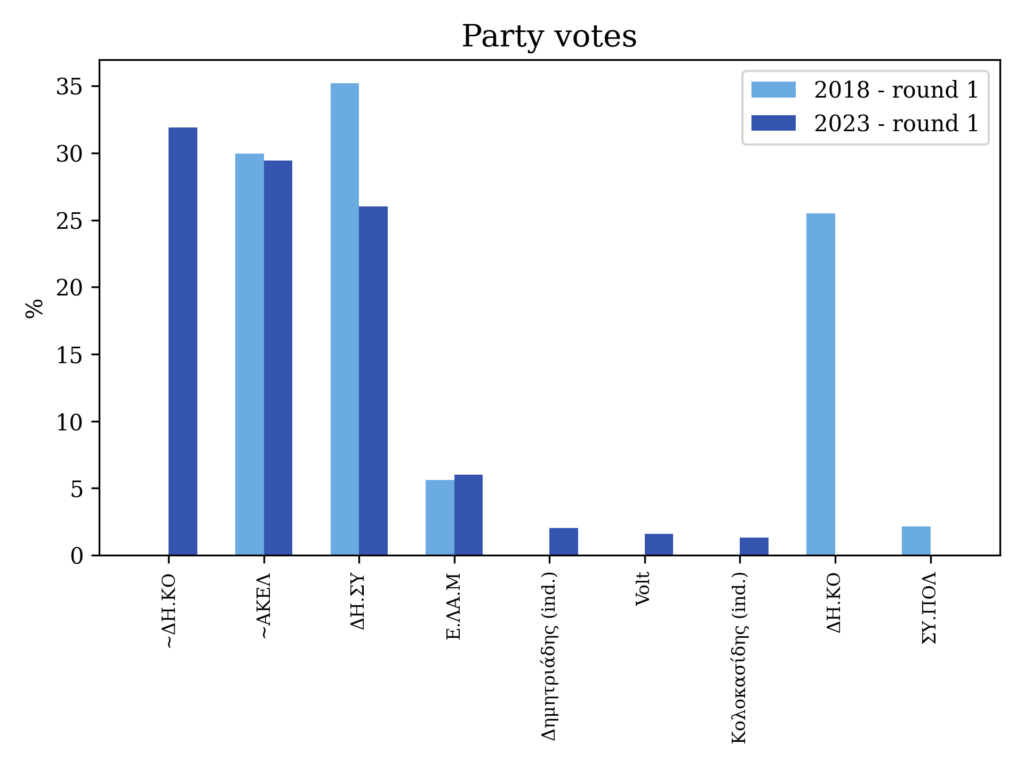
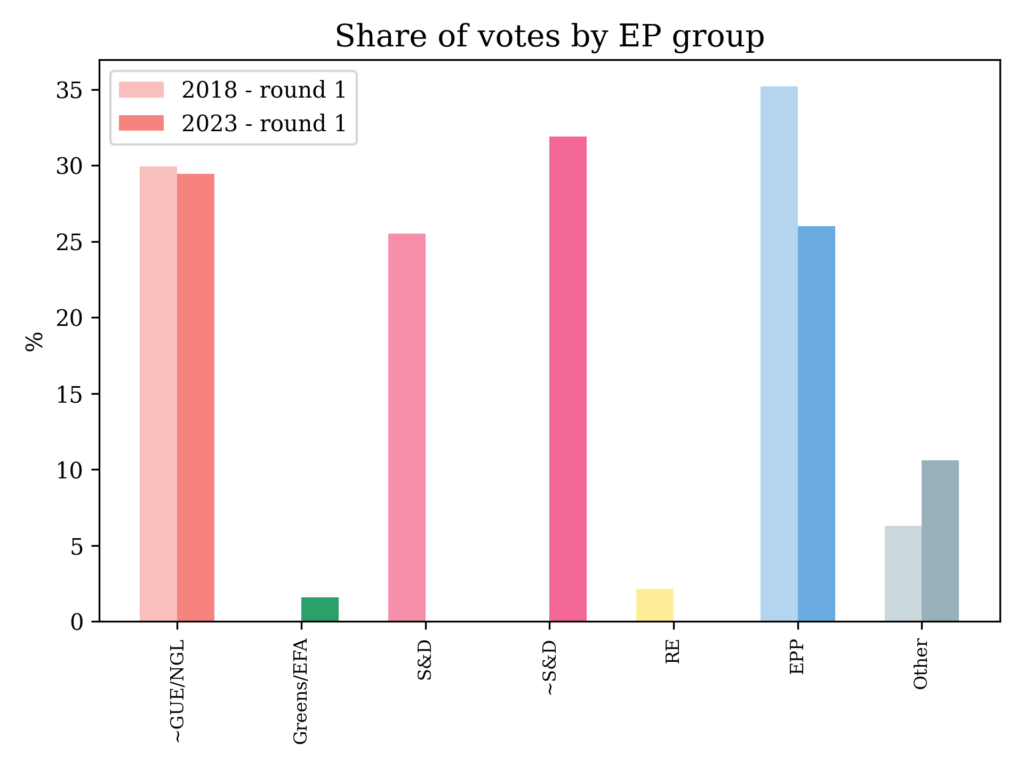
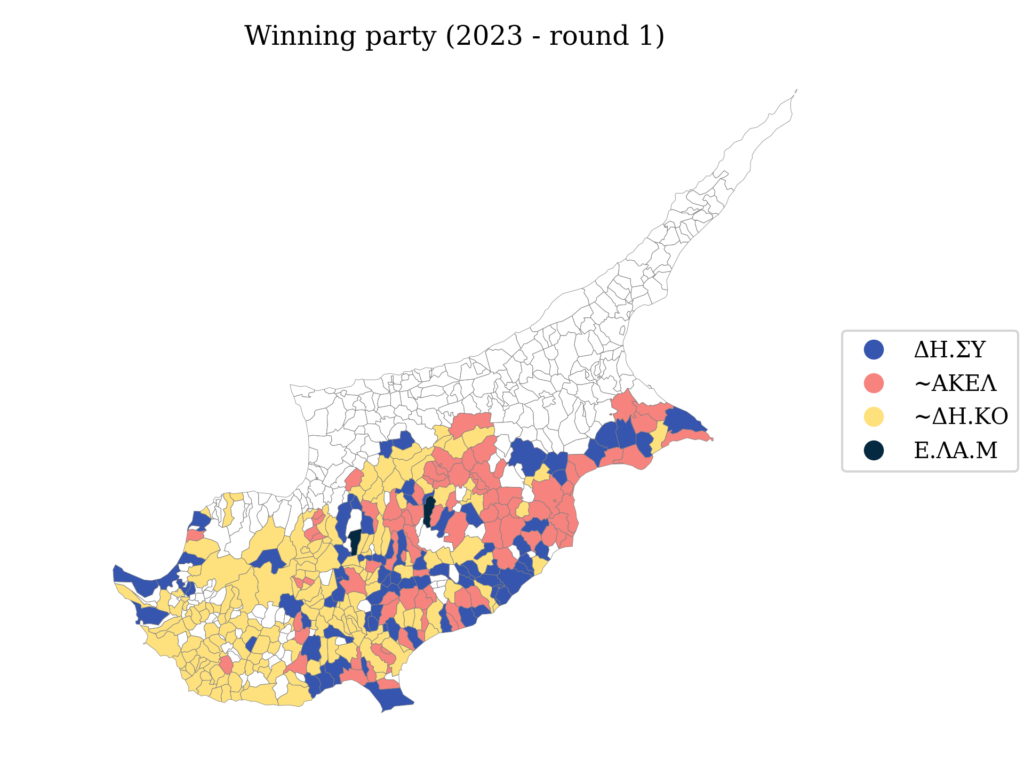
Second round
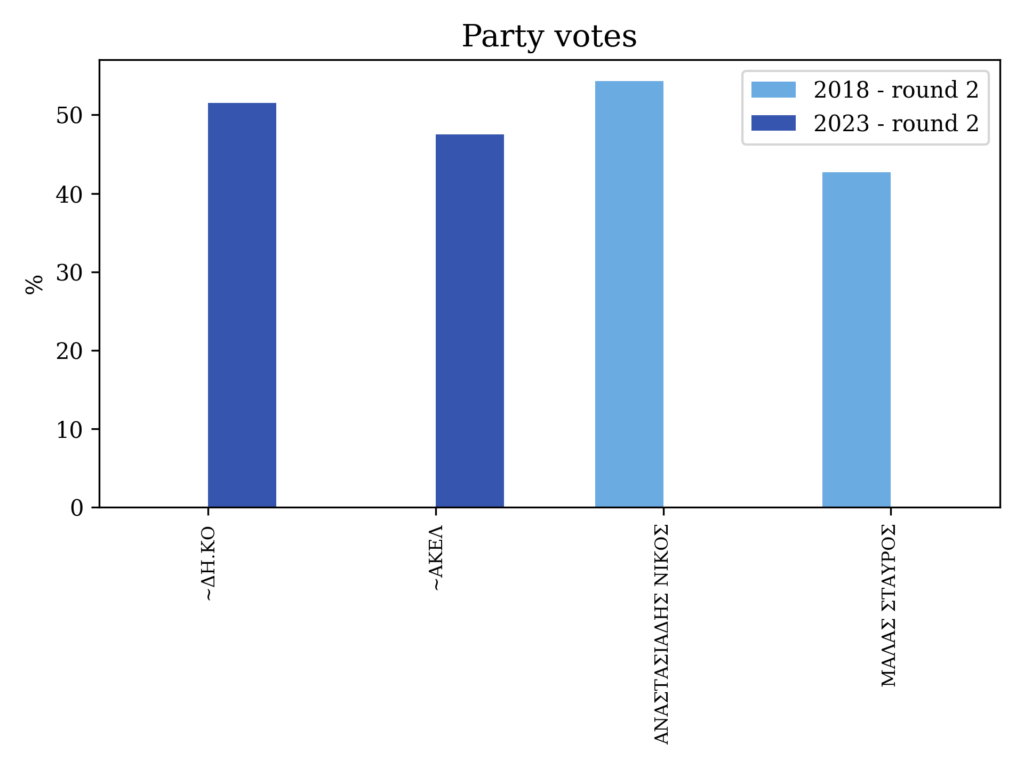
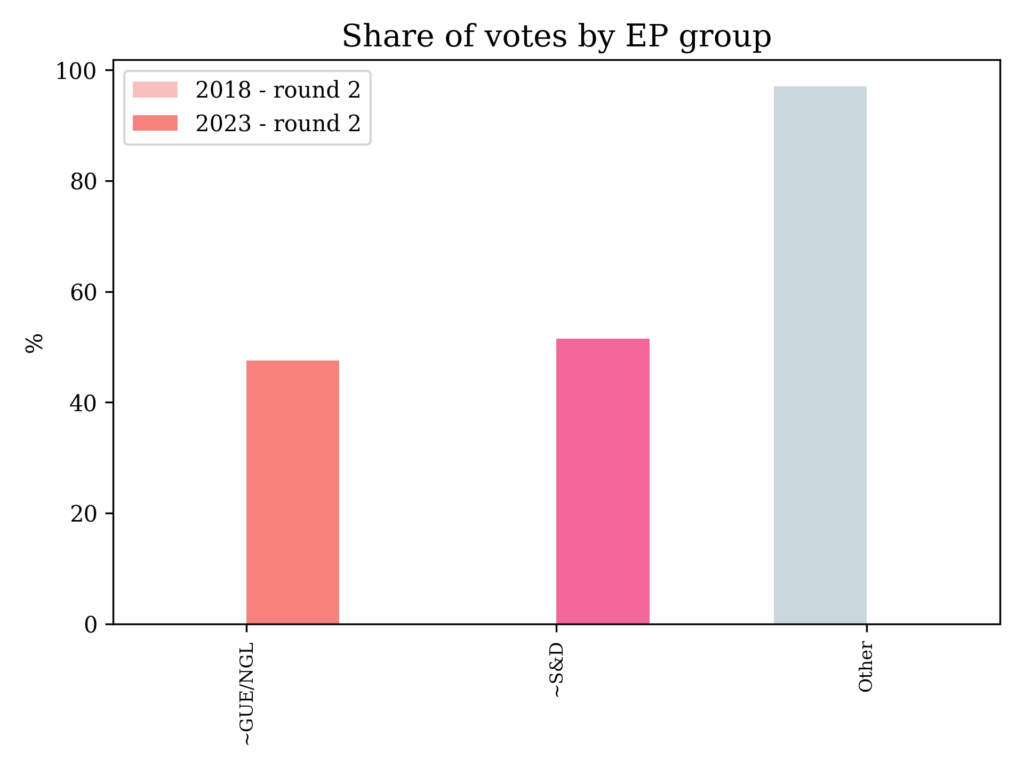
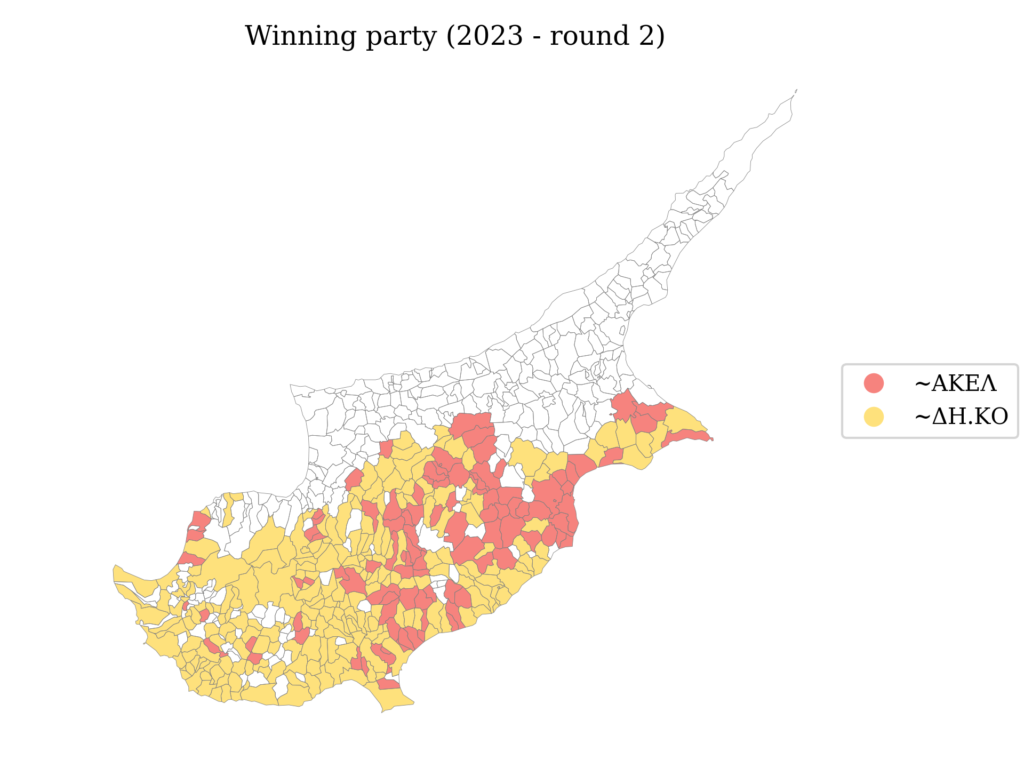
References
Triga, V. & Ioannidis, N. (2023). The Cypriot presidential election of 2023 and its aftermath. PRIO Cyprus Centre. Nicosia: Friedrich-Ebert-Stiftung Cyprus Office.
Ellinas, A. A. & Katsourides, Y. (2021). The Silent Electoral Earthquake in Cyprus: A Crisis of Political Representation. South European Society and Politics, 26:3, 413-436.
Triga, V., Mendez, F., & Tziouvas, C. (2018). Post-crisis normalisation? The 2018 Presidential Elections. South European Society and Politics, 24:1, 103-127.
Presidential elections 2023. Statement by the General Election Commissioner for the procedural issues pertaining the presidential elections. Online.
citer l'article
Yiannos Katsourides, Presidential election in Cyprus, 5 and 12 February 2023, Nov 2023,
à lire dans cette issue
voir toute la revue





